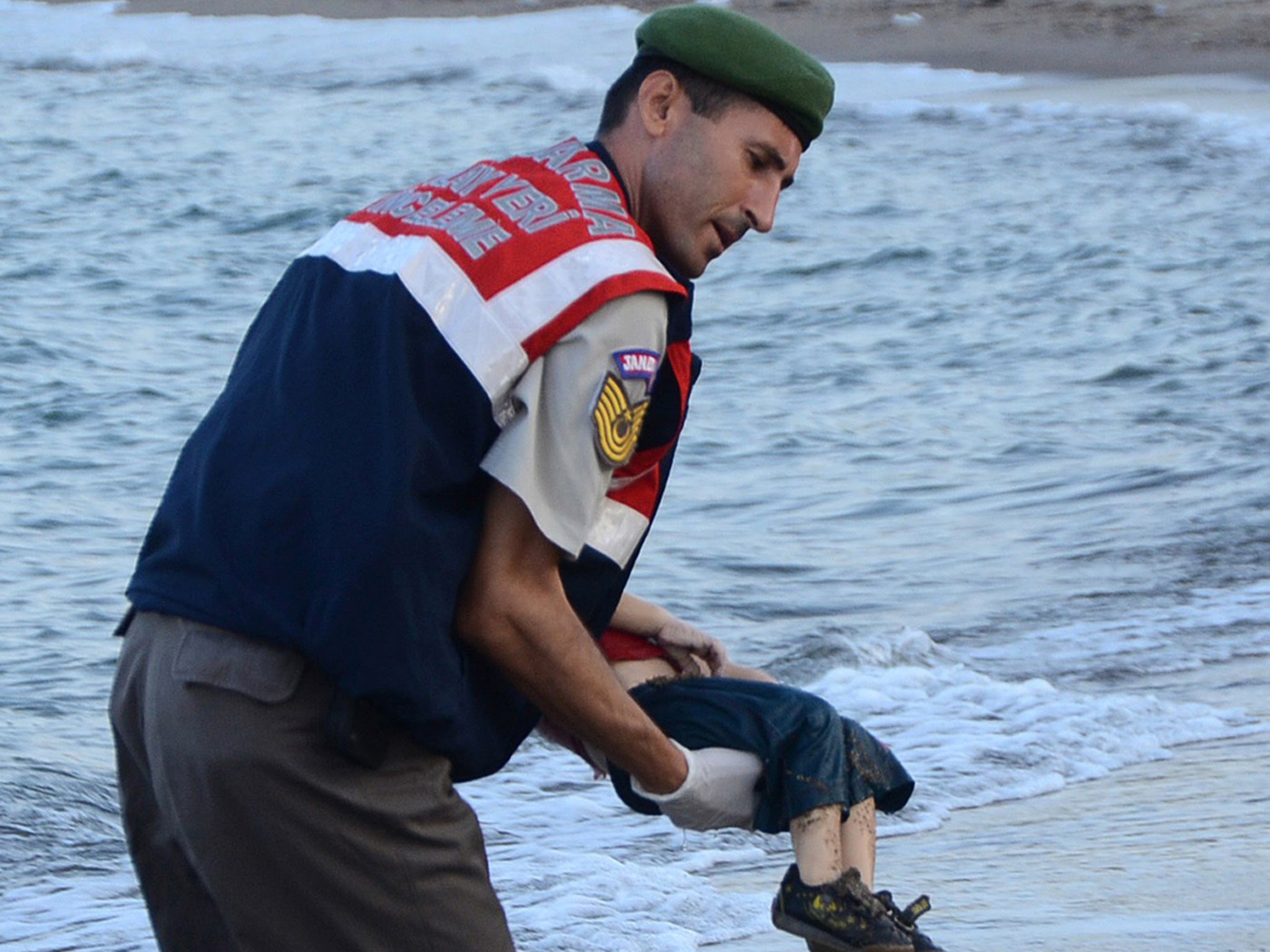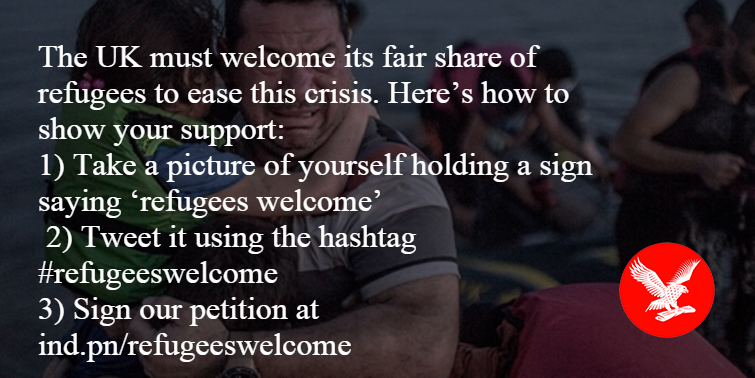Abdullah Kurdi: Father of drowned son Aylan describes the moment his two children 'slipped away'
'I just want to see my children for the last time and stay forever with them'

Your support helps us to tell the story
From reproductive rights to climate change to Big Tech, The Independent is on the ground when the story is developing. Whether it's investigating the financials of Elon Musk's pro-Trump PAC or producing our latest documentary, 'The A Word', which shines a light on the American women fighting for reproductive rights, we know how important it is to parse out the facts from the messaging.
At such a critical moment in US history, we need reporters on the ground. Your donation allows us to keep sending journalists to speak to both sides of the story.
The Independent is trusted by Americans across the entire political spectrum. And unlike many other quality news outlets, we choose not to lock Americans out of our reporting and analysis with paywalls. We believe quality journalism should be available to everyone, paid for by those who can afford it.
Your support makes all the difference.Not far from where a sobbing Abdullah al-Kurdi described the moment his two children “slipped away” into the inky blackness of the Aegean Sea, plans were being hatched. Aylan Kurdi, his brother Galip, five, and mother Rehan, 35, will not be the last Syrian bodies to wash up on the Turkish coast.
On the Bodrum peninsular, where the waves lapped at the lifeless body of three-year-old Aylan on 2 September, Syrians continue to gaze across the two-mile stretch of water from Akyarlar to the Greek island of Kos – and Europe. Just as Abdullah Kurdi and his family hoped for a better life, so too do many of the refugees waiting for the smuggler’s call in the hotels and streets of nearby Bodrum.
“Look at them. Of course we are afraid, but there is no future for them here, no school,” said 21-year-old, Zeina, from Damascus, pointing at the children surrounding her. She hopes to reach Greece and then Germany with her entire family – some three dozen brothers, sisters, aunts, uncles and cousins – including her two-year-old daughter and her unborn child. She pats a plastic bag stuffed with life jackets. “We know the risks,” she says.
So too must have the al-Kurdi family. Abdullah Kurdi told police that they had decided to row to Greece themselves after two failed attempts to reach Kos with the help of smugglers.
Before that, it emerged he had hoped to emigrate from Kobani in Syria to Canada, where his sister, Teema Kurdi, lives.
Mr Kurdi said that the boat’s captain, a Turk, panicked when high waves battered the boat and jumped into the sea. The lifejackets the Kurdi family carried were lost when the boat capsized. “I took over and started steering, the waves were so high and the boat flipped,” said Mr Kurdi. “I was holding my wife’s hand. My children slipped away from my hands. We tried to hold on to the boat. Everyone was screaming in pitch darkness.”
A harbour official in Bodrum, who asked to remain anonymous as he was not authorised to speak to the press, told The Independent: “The boat wasn’t a proper boat. It was like a boat for children – a toy. They bought it from a shop, along with an electric motor that’s like a toy, too.” The official added: “Every week, four or five people die.”
Turkish police have arrested four suspected traffickers over the 12 deaths. The four men are all reported to be Syrian. One of the survivors, Zeynep Abbas Hadi, fainted after seeing the dead bodies of two of her children, aged nine and 11. Her seven-year-old daughter reportedly survived. Another survivor, Syrian Omer Mohsin, said he swam ashore after the boat sank and was now looking for his missing brother. “Me and my brother paid €2,050 each,” he said.
Mr Kurdi hopes the whole world will hear of the deaths of his wife and children. “The things that happened to us here, in the country where we took refuge to escape war in our homeland, we want the whole world to see this,” he told reporters. “We want the world’s attention on us, so that they can prevent the same from happening to others. Let this be the last.”
The Kurdi family had been trying to emigrate to Canada after fleeing Kobani three years ago. Mr Kurdi said Canadian officials had offered him citizenship after seeing what had happened.
At Bodrum’s bus station, Reem, also a Syrian Kurd from Kobani, said she had a sister with a German passport in Saarbrücken. She has been unable to obtain visas for her family. “I thought we would go to Europe from Bodrum,” she said waiting for the bus to Izmir. “Then I saw the boy, and I saw he was Kurdish, too, and I decided I couldn’t do it. I want a safe road to Germany for my children.” Just as life has returned to normal for the Syrians contemplating across the sea to Kos, it has also returned to normal at Bodrum.
On Akyarlar’s beaches swimmers and sun-bathers returned to the coast; only the presence of television cameras hinted at the tragedy that unfolded there.
Siyabe Günes, who lives in Akyarlar, remembered seeing the Kurdi family in the days before they left, camping out by the beach. On her phone, she has a picture of Aylan sleeping in the sand, alive. “I saw the pictures on television, and he looked like he was still sleeping,” she said, tears filling her eyes. “I couldn’t believe it. It’s just too sad.”
Nilufer Demir, the Dogan news agency photographer who took the picture of Aylan, told CNN: “When I realised there was nothing to do to bring that boy back to life I thought I had to take his picture... to show the tragedy. I hope the impact this photo has created will help bring a solution.”
Canada’s Citizenship and Immigration Minister, Chris Alexander, said that, like all Canadians, he was “deeply saddened” by the deaths. “I am meeting officials to ascertain both the facts of the case of the Kurdi family and to receive an update on the migrant crisis,” he said.
Teema Kurdi, a resident of Vancouver, said she had tried to sponsor another brother to come to Canada, but the application had been rejected. She had hoped to sponsor Aylan and his family next. “They didn’t deserve to die, they didn’t, they were going for a better life,” she told reporters. That shouldn’t have happened. It shouldn’t have happened to them. To be honest I don’t want to just blame the Canadian government. I’m blaming the whole world for this.”
She added: “When the two boys died in his hands, in his arms, he tried to save them. When the boat flipped... and the waves keep pushing him down, those two boys, they were in his arms. “
Mr Kurdi, however, now does not want his family to travel to Canada. He hopes to return with their bodies to their hometown Kobani, which they left in 2012. “I just want to see my children for the last time and stay forever with them,” he said.

Join our commenting forum
Join thought-provoking conversations, follow other Independent readers and see their replies
Comments